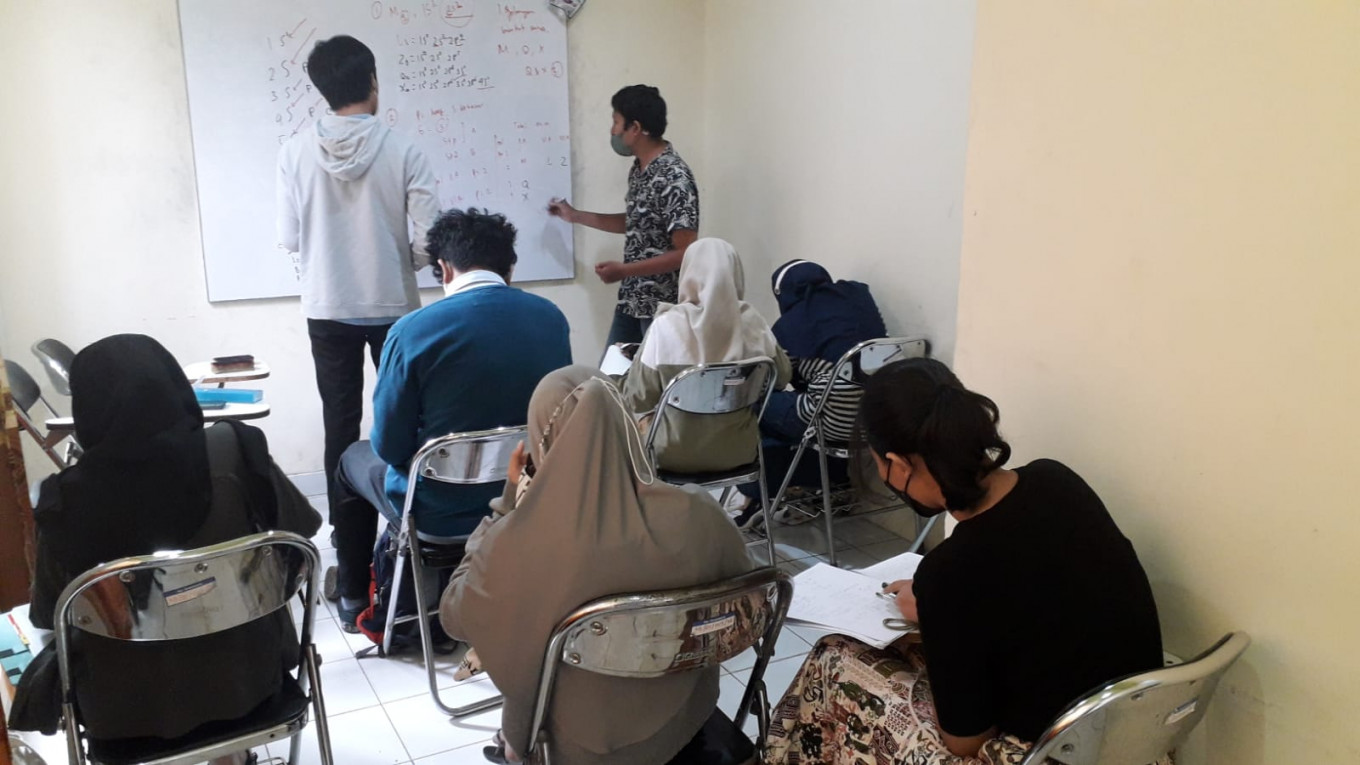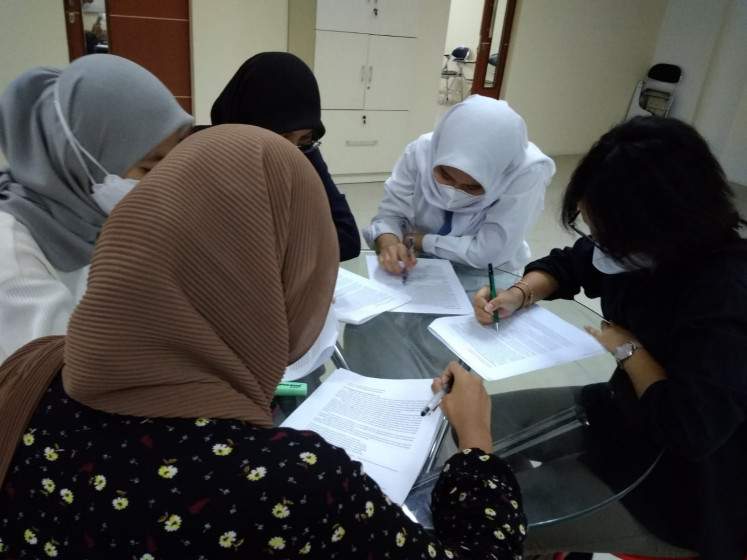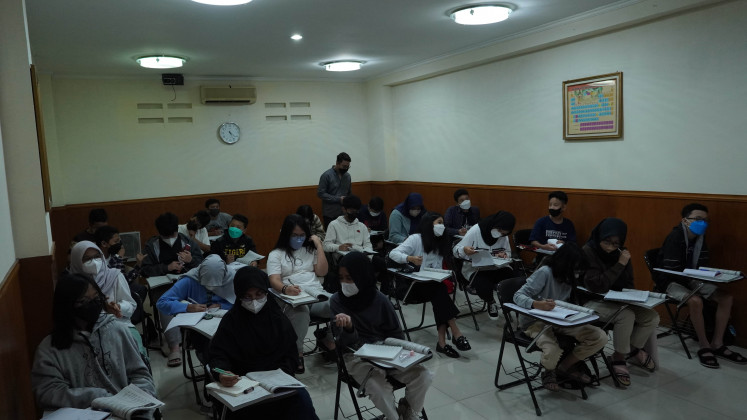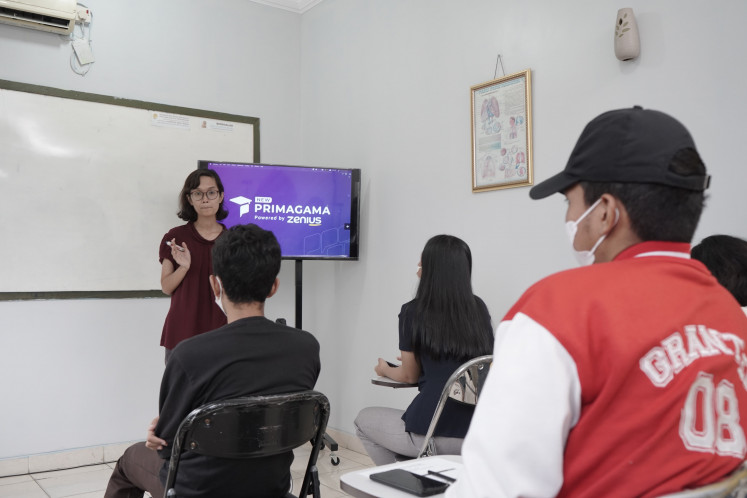Popular Reads
Top Results
Can't find what you're looking for?
View all search resultsPopular Reads
Top Results
Can't find what you're looking for?
View all search resultsAmid the rise of online 'bimbel', offline tutoring services stand their ground
Despite the rise of internet-based competition, face-to-face after-school lessons remain the preferred option for students
Change text size
Gift Premium Articles
to Anyone
Despite the rise of internet-based competition, face-to-face after-school lessons remain the preferred option for students.
It has been over two years since the pandemic started. Schools have opened and closed repeatedly; students have come in and out of classrooms. But the bimbingan belajar (tutoring) industry, or bimbel for short, is experiencing things differently depending on which one you ask about: online bimbel or the conventional, offline ones.
“The number of students we have now is still far below pre-pandemic norms. We only have about 100 students,” Edwin Nofsan Naufal told The Jakarta Post on July 5.
Edwin is the CEO of Excellent Institute or EXIST bimbel, located in South Tangerang, Banten.
“But this year is a lot better, thankfully, since in-class learning is back in schools. Parents and their children are also less afraid now,” he said, preparing to welcome more students at the start of this new school year.
Pandemic battle
The long history of bimbel in Indonesia is believed to have started in the 1970s with the one-man tutor Siky Muljono. The Chinese-Indonesian, who studied medicine at the University of Indonesia (UI), started his own tutoring session at his house on Jl. Salemba Raya, Jakarta, just to help some friends understand organic chemistry better. He then acquired more than 300 students as the business took off, which lasted until the 1990s.
The Post has tried to get a hold of Muljono or his family but has yet to receive a reply. Now with little known about his condition or whereabouts, a group of people who claim they were some of Muljono’s former students set up a Facebook page dedicated to him, reminiscing about his harsh teaching methods and endearingly calling him the “Boss”.
After Muljono, early private tutoring services started popping up. Household names like Primagama and Sony Sugema College later appeared in the 1980s and 1990s, and the industry grew exponentially in the decades following.
But nothing seemed to prepare bimbel CEOs for a financially crushing global pandemic in 2020.
“Until 2019 and early 2020, EXIST actually experienced magnificent development. In fact, it was our best year financially ever since we started in 2010,” Edwin said.
During pre-pandemic times, EXIST recorded around 1,300 students in all of its eight branches across South Tangerang.
“All of a sudden, the pandemic happened in March 2020, and our condition dropped to the floor. Even during the new school year in July 2020, the number of students we had left was only 20 percent, so just around 300 students in the following year,” the CEO said.
“We eventually had to close down some of our branches and lay off dozens of our staff and teachers because our financial condition could not possibly provide for them.”
Bigger bimbel chains have had slightly better luck. Ganesha Operation (GO), one of the oldest bimbel in Indonesia with hundreds of outlets across the country, experienced a much less severe drop in students and was able to maintain all of its workers.
“Despite the pandemic, the need for students to study is still there. From our data, we experienced a decrease of about 20 percent in the number of students,” Ganesha Operation president director Bob Foster told the Post on July 14.
During the hardest times of the pandemic, these conventional bimbel adapted to Zoom sessions and, at times, were even open with health protocols.
“The fact is, when schools were closing, many conventional bimbel were still open for in-class learning — with intense health protocols, of course. Because when we offered an online class, many parents and students refused it since they thought it was not effective,” Edwin said.
Bob also said that Ganesha Operation still continued to open whenever they could due to parents’ demands.
“What happened when there were months of total lockdowns? Well, we went full online. [This is] because Ganesha Operation relies on online technologies even during in-class learning,” Bob said, hailing its mobile application GO Kreasi.
Students' choice: The students of Ganesha Operation on Jl. Sumatera, Bandung, are pictured studying on July 14. (Courtesy of Ganesha Operation) (Courtesy of Ganesha Operation/Courtesy of Ganesha Operation)Real vs. virtual world
Having their own mobile application is one of the things conventional bimbel did to compete against online bimbel, which has had a steady rise in recent years.
“We’ve already had this app two years before the pandemic,” Bob said, right when he saw a rise in competition.
EXIST also has a similar app. Both apps focus on functions beyond online learning, such as the students’ administration, book materials, attendance, try-out scores and so on.
But with the pandemic forcing everyone to familiarize themselves with the virtual world, it only seemed that online bimbel was the future of private tutoring in Indonesia.
“When [education technology companies] like Zenius and Ruangguru first came up, we also thought, ‘Is there a shift in trend?’ Especially during the pandemic — while offline bimbel were dropping, [the online ones] were growing very rapidly,” Edwin said.
The pandemic did have a positive impact on driving the economy of digital businesses, including the education sector.
“At the start of the pandemic, our number of users more than quintupled,” CEO of online bimbel Zenius Education, Rohan Monga, told the Post on July 11.
Going hybrid: A look at the New Primagama Powered by Zenius offline class in Sukatani, Depok, West Java, on July 11. (Courtesy of Zenius) (Courtesy of Zenius/Courtesy of Zenius)Turn of the tide
But recently, it is no secret that the digital industry is struggling to stay afloat, with start-ups like Zenius and Pahamify having to lay off many of their employees.
“We had to take that action since the macroeconomic conditions are not doing well right now,” Rohan expressed.
Edwin’s prediction that these online versions would be the future of bimbel also missed the mark a bit, he thought.
“Now that the pandemic has receded, it seems like the euphoric trend for online bimbel kind of died down,” he said.
And looking at Zenius and Ruangguru’s recent strategic businesses, it might be apparent why: More online bimbel are now opening offline classes for their students instead.
“Our students and their parents are asking us to open offline classes,” Rohan said.
Zenius collaborated with one of Indonesia’s oldest and biggest conventional bimbel Primagama last February to have an offline bimbel class, resulting in a hybrid learning environment.
“The pandemic condition also makes the cost of offline learning services more affordable,” Rohan said as one of the reasons. “In order to ensure business continuity, we must consolidate and synergize business processes.”
Evidently, more students also prefer in-class learning to a virtual one. A survey from UNICEF in 2020 showed that over 80 percent of students across the country would rather be in offline classes.
“I understand the subject better in offline bimbel, and I could also ask the teachers directly,” 17-year-old Nabila from Bintaro told the Post on July 8, saying she felt more comfortable learning that way.
While Nabila looked for the best bimbel on the internet by herself, others like the 12th-grader from Ariq at Al-Azhar BSD Islamic high school also decided to join offline bimbel because of his parents’ suggestions.
“For me, online bimbel is less efficient in helping me understand more materials than offline bimbel,” he said to the Post on July 7.
Ariq conceded, however, that he could be more relaxed learning with online bimbel. Moreover, he has been used to online learning now after months of school’s virtual classes.
“I also want to look for the [tryouts and consultation for university major],” Nabila said about what she seeks in offline bimbel.
As the CEO, Edwin is known for coming to classes and helping the students with suggestions on their preferred major according to their scores and ability. This direct connection, he believes, is one of the things that keep students wanting to be in offline classes.
“We’ll keep doing what we think is best, which is going to schools, holding motivational seminars and collaborating with the schools’ programs, but at the same time, we also optimize digital marketing [and] social media presence,” Edwin said.
If education technology companies are now taking the offline route as well, he figures they still have a place in students’ hearts.













